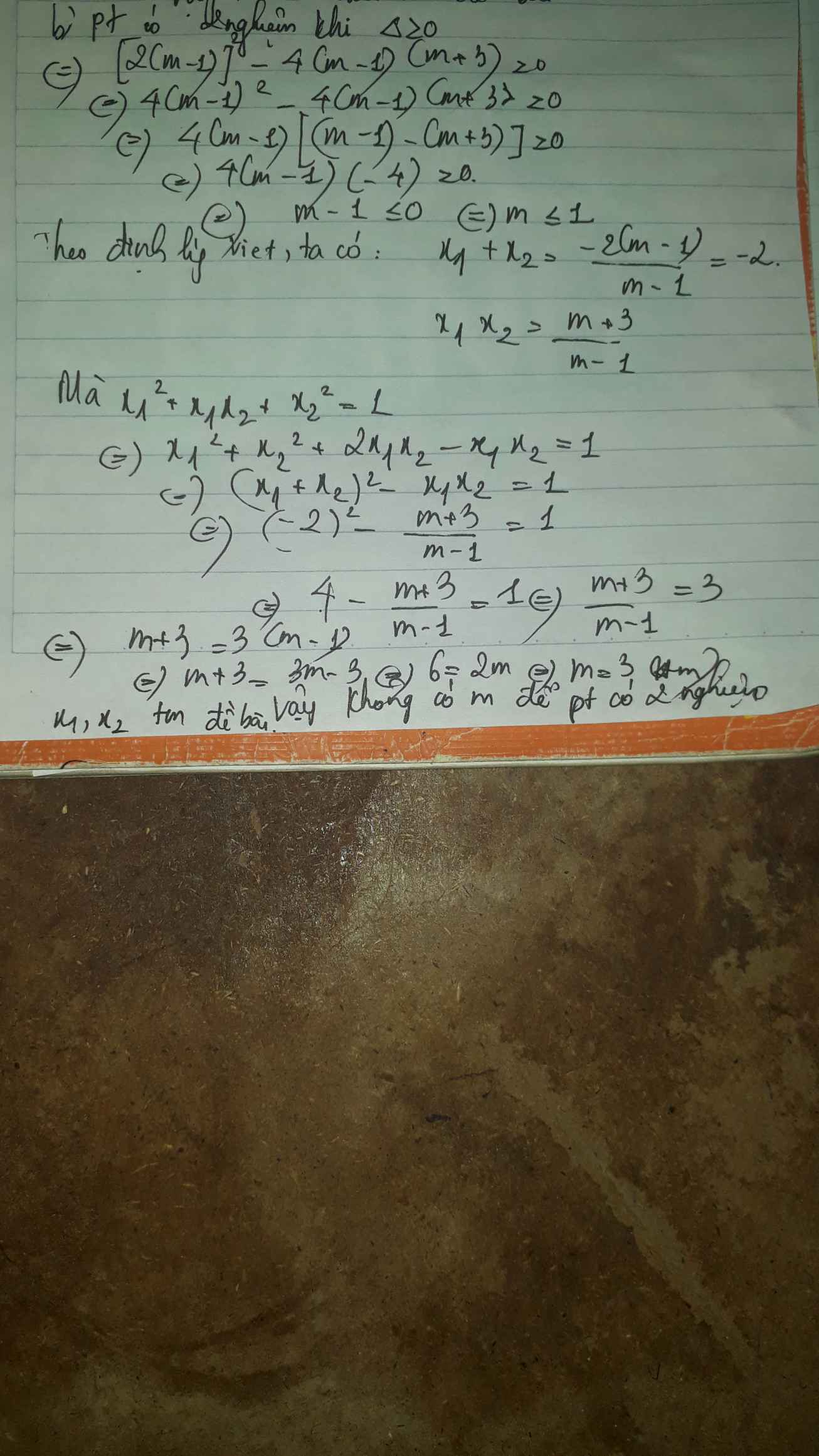Hãy nhập câu hỏi của bạn vào đây, nếu là tài khoản VIP, bạn sẽ được ưu tiên trả lời.

\(x^2-2\left(m+4\right)x+m^2+8m-9=0\left(1\right)\)
Ta giải \(\Delta=[-2\left(m+4\right)]^2-4\left(m^2+8m-9\right)=100>0\forall m\)
suy ra pt có 2 nghiệm phân biệt \(x_1,x_2\forall m\).
Ta có: \(x_1=m-1\), \(x_2=m+1\) (thay \(\Delta\) vào công thức tìm nghiệm phân biệt).
Gọi \(A=\dfrac{x_1^2+x_2^2-48}{x_1^2+x_2^2}\).
\(\Rightarrow A=1-\dfrac{48}{x_1^2+x_2^2}=1-\dfrac{48}{\left(m-1\right)^2+\left(m+1\right)^2}=1-\dfrac{24}{m^2+1}\).
Để biểu thức A nguyên thì \(\dfrac{24}{m^2+1}\) nguyên, suy ra \(m^2+1\inƯ\left(24\right)\).
\(\Rightarrow m^2+1\in\left\{1;2;4;6;8;12;24\right\}\)
\(\Rightarrow m\in\left\{0;\pm1\right\}\) (vì m nhận giá trị nguyên)
Vậy \(m\in\left\{0;\pm1\right\}\) là giá trị cần tìm.
Mình chỉnh sửa lại một chút nhé.
\(A=1-\dfrac{24}{m^2+2}\)
\(\Rightarrow...\)\(\Rightarrow\)\(m^2+2\in\left\{1;2;3;4;6;8;12;24\right\}\)
\(\Rightarrow m\in\left\{0;\pm1;\pm2\right\}\)
Vậy...

Δ=(2m-2)^2-4(m-3)
=4m^2-8m+4-4m+12
=4m^2-12m+16
=4m^2-12m+9+7=(2m-3)^2+7>=7>0 với mọi m
=>Phương trình luôn có hai nghiệm phân biệt
\(\left(\dfrac{1}{x1}-\dfrac{1}{x2}\right)^2=\dfrac{\sqrt{11}}{2}\)
=>\(\dfrac{1}{x_1^2}+\dfrac{1}{x_2^2}-\dfrac{2}{x_1x_2}=\dfrac{\sqrt{11}}{2}\)
=>\(\dfrac{\left(\left(x_1+x_2\right)^2-2x_1x_2\right)}{\left(x_1\cdot x_2\right)^2}-\dfrac{2}{x_1\cdot x_2}=\dfrac{\sqrt{11}}{2}\)
=>\(\dfrac{\left(2m-2\right)^2-2\left(m-3\right)}{\left(-m+3\right)^2}-\dfrac{2}{-m+3}=\dfrac{\sqrt{11}}{2}\)
=>\(\dfrac{4m^2-8m+4-2m+6}{\left(m-3\right)^2}+\dfrac{2}{m-3}=\dfrac{\sqrt{11}}{2}\)
=>\(\dfrac{4m^2-10m+10+2m-6}{\left(m-3\right)^2}=\dfrac{\sqrt{11}}{2}\)
=>\(\sqrt{11}\left(m-3\right)^2=2\left(4m^2-8m+4\right)\)
=>\(\sqrt{11}\left(m-3\right)^2=2\left(2m-2\right)^2\)
=>\(\Leftrightarrow\left(\dfrac{m-3}{2m-2}\right)^2=\dfrac{2}{\sqrt{11}}\)
=>\(\left[{}\begin{matrix}\dfrac{m-3}{2m-2}=\sqrt{\dfrac{2}{\sqrt{11}}}\\\dfrac{m-3}{2m-2}=-\sqrt{\dfrac{2}{\sqrt{11}}}\end{matrix}\right.\)
mà m nguyên
nên \(m\in\varnothing\)

\(\Delta'=\left(m+1\right)^2-\left(2m-3\right)=m^2+4>0\) ; \(\forall m\)
\(\Rightarrow\) Phương trình luôn có 2 nghiệm pb với mọi m
Theo hệ thức Viet: \(\left\{{}\begin{matrix}x_1+x_2=2m+2\\x_1x_2=2m-3\end{matrix}\right.\)
Ta có: \(P=\left|\dfrac{x_1+x_2}{x_1-x_2}\right|\ge0\)
\(\Rightarrow P_{min}=0\) khi \(x_1+x_2=0\Leftrightarrow m=-1\)
Đề là yêu cầu tìm max hay min nhỉ? Min thế này thì có vẻ là quá dễ

b) phương trình có 2 nghiệm \(\Leftrightarrow\Delta'\ge0\)
\(\Leftrightarrow\left(m-1\right)^2-\left(m-1\right)\left(m+3\right)\ge0\)
\(\Leftrightarrow m^2-2m+1-m^2-3m+m+3\ge0\)
\(\Leftrightarrow-4m+4\ge0\)
\(\Leftrightarrow m\le1\)
Ta có: \(x_1^2+x_1x_2+x_2^2=1\)
\(\Leftrightarrow\left(x_1+x_2\right)^2-2x_1x_2=1\)
Theo viet: \(\left\{{}\begin{matrix}x_1+x_2=-\dfrac{b}{a}=2\left(m-1\right)\\x_1x_2=\dfrac{c}{a}=m+3\end{matrix}\right.\)
\(\Leftrightarrow\left[-2\left(m-1\right)^2\right]-2\left(m+3\right)=1\)
\(\Leftrightarrow4m^2-8m+4-2m-6-1=0\)
\(\Leftrightarrow4m^2-10m-3=0\)
\(\Leftrightarrow\left[{}\begin{matrix}m_1=\dfrac{5+\sqrt{37}}{4}\left(ktm\right)\\m_2=\dfrac{5-\sqrt{37}}{4}\left(tm\right)\end{matrix}\right.\Rightarrow m=\dfrac{5-\sqrt{37}}{4}\)

a: Thay m=-5 vào (1), ta được:
\(x^2+2\left(-5+1\right)x-5-4=0\)
\(\Leftrightarrow x^2-8x-9=0\)
=>(x-9)(x+1)=0
=>x=9 hoặc x=-1
b: \(\text{Δ}=\left(2m+2\right)^2-4\left(m-4\right)=4m^2+8m+4-4m+16=4m^2+4m+20>0\)
Do đó: Phương trình luôn có hai nghiệm phân biệt
\(\dfrac{x_1}{x_2}+\dfrac{x_2}{x_1}=-3\)
\(\Leftrightarrow x_1^2+x_2^2=-3x_1x_2\)
\(\Leftrightarrow\left(x_1+x_2\right)^2+x_1x_2=0\)
\(\Leftrightarrow\left(2m+2\right)^2+m-4=0\)
\(\Leftrightarrow4m^2+9m=0\)
=>m(4m+9)=0
=>m=0 hoặc m=-9/4

a. thay m=-4 vào (1) ta có:
\(x^2-5x-6=0\)
Δ=b\(^2\)-4ac= (-5)\(^2\) - 4.1.(-6)= 25 + 24= 49 > 0
\(\sqrt{\Delta}=\sqrt{49}=7\)
x\(_1\)=\(\dfrac{-b+\sqrt{\Delta}}{2a}=\dfrac{5+7}{2}\)=6
x\(_2\)=\(\dfrac{-b-\sqrt{\Delta}}{2a}=\dfrac{5-7}{2}\)=-1
vậy khi x=-4 thì pt đã cho có 2 nghiệm x\(_1\)=6; x\(_2\)=-1



Phương trình có : \(\Delta=b^2-4ac=\left[-\left(m+1\right)\right]^2-4.1.\left(-2\right)\)
\(\Rightarrow\Delta=\left(m+1\right)^2+8>0\)
Suy ra phương trình có hai nghiệm phân biệt với mọi \(m\).
Theo định lí Vi-ét : \(\left\{{}\begin{matrix}x_1+x_2=m+1\\x_1x_2=-2\end{matrix}\right.\)
Theo đề bài : \(\left(1-\dfrac{2}{x_1+1}\right)^2+\left(1-\dfrac{2}{x_2+1}\right)^2=2\)
\(\Leftrightarrow\dfrac{\left(x_1-1\right)^2}{\left(x_1+1\right)^2}+\dfrac{\left(x_2-1\right)^2}{\left(x_2+1\right)^2}=2\)
\(\Leftrightarrow\dfrac{\left[\left(x_1-1\right)\left(x_2+1\right)\right]^2+\left[\left(x_2-1\right)\left(x_1+1\right)\right]^2}{\left[\left(x_1+1\right)\left(x_2+1\right)\right]^2}=2\)
\(\Leftrightarrow\left[\left(x_1-1\right)\left(x_2+1\right)\right]^2+\left[\left(x_2-1\right)\left(x_1+1\right)\right]^2-2\left[\left(x_1+1\right)\left(x_2+1\right)\right]^2=0\)
\(\Leftrightarrow\left(x_2+1\right)^2\left[\left(x_1-1\right)^2-\left(x_1+1\right)^2\right]+\left(x_1+1\right)^2\left[\left(x_2-1\right)^2-\left(x_2+1\right)^2\right]=0\)
\(\Leftrightarrow-4x_1\left(x_2+1\right)^2-4x_2\left(x_1+1\right)^2=0\)
\(\Leftrightarrow x_1x_2^2+2x_1x_2+x_1+x_1^2x_2+2x_1x_2+x_2=0\)
\(\Leftrightarrow x_1x_2\left(x_1+x_2\right)+4x_1x_2+\left(x_1+x_2\right)=0\)
\(\Rightarrow-2\left(m+1\right)+4\cdot\left(-2\right)+m+1=0\)
\(\Leftrightarrow m=-9\)
Vậy : \(m=-9.\)